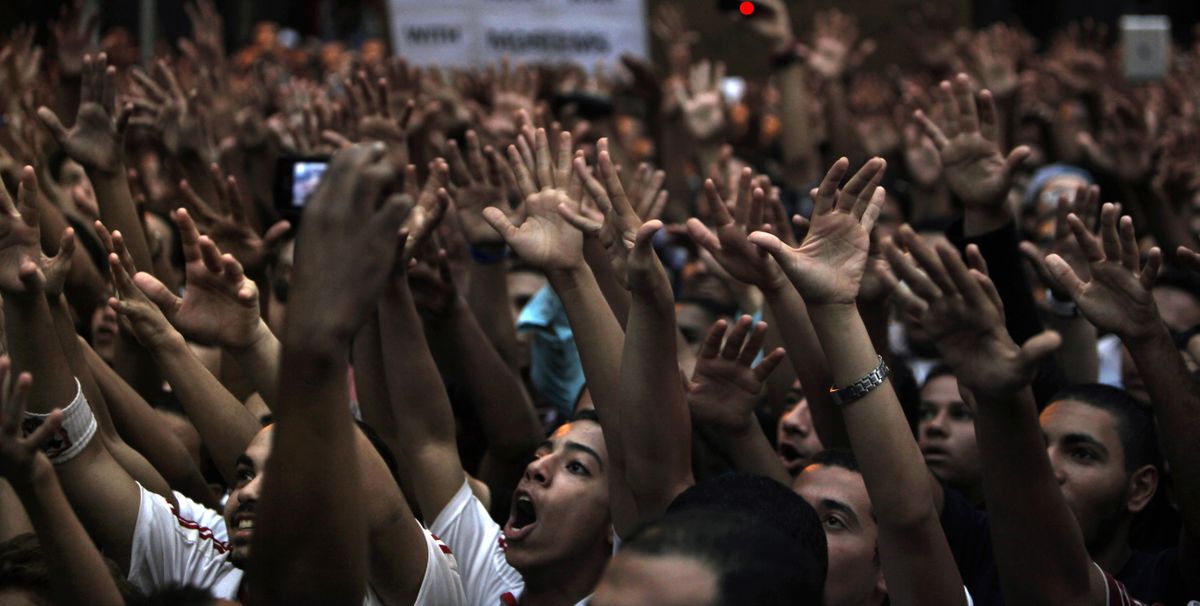Film sparks violent protests
U.S. diplomat killed amid anger in North Africa

CAIRO – Protesters angered over a film that ridiculed Islam’s Prophet Muhammad fired gunshots and burned down the U.S. consulate in the eastern Libyan city of Benghazi, killing one American diplomat, witnesses and the State Department said. In Egypt, protesters scaled the walls of the U.S. embassy in Cairo and replaced an American flag with an Islamic banner.
They were the first such assaults on U.S. diplomatic facilities in either country, at a time when both Libya and Egypt are struggling to overcome the turmoil following the ouster of their longtime leaders, Moammar Gadhafi and Hosni Mubarak, in uprisings last year.
The protests in both countries were sparked by outrage over a film ridiculing Muhammad produced by an American in California and being promoted by an extreme anti-Muslim Egyptian Christian campaigner in the United States. Excerpts from the film dubbed into Arabic were posted on YouTube.
U.S. Secretary of State Hillary Rodham Clinton confirmed that one State Department officer had been killed in the protest at the U.S. consulate in Benghazi. She strongly condemned the attack and said she had called Libyan President Mohammed el-Megarif “to coordinate additional support to protect Americans in Libya.”
Clinton expressed concern that the protests might spread to other countries. She said the U.S. is working with “partner countries around the world to protect our personnel, our missions, and American citizens worldwide.”
“Some have sought to justify this vicious behavior as a response to inflammatory material posted on the Internet,” Clinton said in a statement released by the State Department. “The United States deplores any intentional effort to denigrate the religious beliefs of others. Our commitment to religious tolerance goes back to the very beginning of our nation. But let me be clear: There is never any justification for violent acts of this kind.”
In Benghazi, a large mob stormed the U.S. consulate, with gunmen firing their weapons, said Wanis al-Sharef, an Interior Ministry official in Benghazi. A witness said attackers fired automatic weapons and rocket-propelled grenades at the consulate as they clashed with Libyans hired to guard the facility.
Outnumbered by the crowd, Libyan security forces did little to stop them, al-Sharef said. The crowd overwhelmed the facility and set fire to it, burning most of it and looting the contents, witnesses said.
One American was shot to death and a second was wounded in the hand, al-Sharef said.
The violence at the consulate lasted for about three hours, another witness said.
Hours before the Benghazi attack, hundreds of mainly ultraconservative Islamist protesters in Egypt marched to the U.S. Embassy in downtown Cairo, gathering outside its walls and chanting against the movie and the U.S. Most of the embassy staff had left the compound earlier.
Dozens of protesters then scaled the embassy walls, and several went into the courtyard and took down the American flag from a pole. They brought it back to the crowd outside, which tried to burn it, but failing that tore it apart.
The protesters on the wall then raised on the flagpole a black flag with a Muslim declaration of faith. The flag, similar to the banner used by al-Qaida, is commonly used by ultraconservatives around the region.
The crowd grew throughout the evening with thousands standing outside the embassy. Dozens of riot police lined up along the embassy walls but did not stop protesters as they continued to climb and stand on the wall.
The crowd chanted, “Islamic, Islamic. The right of our prophet will not die.” Some shouted, “We are all Osama,” referring to al-Qaida leader bin Laden.
By midnight, the crowd had dwindled.
A senior Egyptian security official at the embassy area said authorities allowed the protest because it was “peaceful.” When they started climbing the walls, he said he called for more troops, denying that the protesters stormed the embassy.
The Cairo embassy is in a diplomatic area in Garden City, only a few blocks from Tahrir Square. The U.S. Embassy is built like a fortress, with a wall several yards high. But security has been scaled back in recent months, with several roadblocks leading to the facility removed after court cases by residents.
The Egyptian Foreign Ministry promised in a statement to provide the necessary security for diplomatic missions and embassies.
In Washington, State Department spokeswoman Victoria Nuland said Egyptian police had removed the demonstrators who entered the embassy grounds.
Muslims find it offensive to depict Muhammad in any fashion, much less in an insulting way.
A 14-minute trailer of the movie that sparked the protests, posted on YouTube in an original English version and another dubbed into Egyptian Arabic, depicts Muhammad as a fraud, a womanizer and a madman in an overtly ridiculing way.
A YouTube spokesperson said the website would not take down the video at this point.
Sam Bacile, an American citizen who said he produced, directed and wrote the two-hour film, said he had not anticipated such a furious reaction.
“I feel sorry for the embassy. I am mad,” Bacile said.
Speaking from a telephone with a California number, Bacile said he is Jewish. Bacile said the film was produced in English and he doesn’t know who dubbed it in Arabic. The full film has not been shown yet, and he has declined distribution offers for now, he said.
Morris Sadek, an Egyptian-born Christian in the U.S. known for his anti-Islam views, told the Associated Press from Washington that he was promoting the video on his website and on certain TV stations, which he did not identify.
Both depicted the film as showing how Coptic Christians are oppressed in Egypt, though it goes well beyond that to ridicule Muhammad – a reflection of their contention that Islam as a religion is inherently oppressive.
For several days, Egyptian media have been reporting on the video, playing some excerpts from it and blaming Sadek for it, with ultraconservative clerics going on air to denounce it.